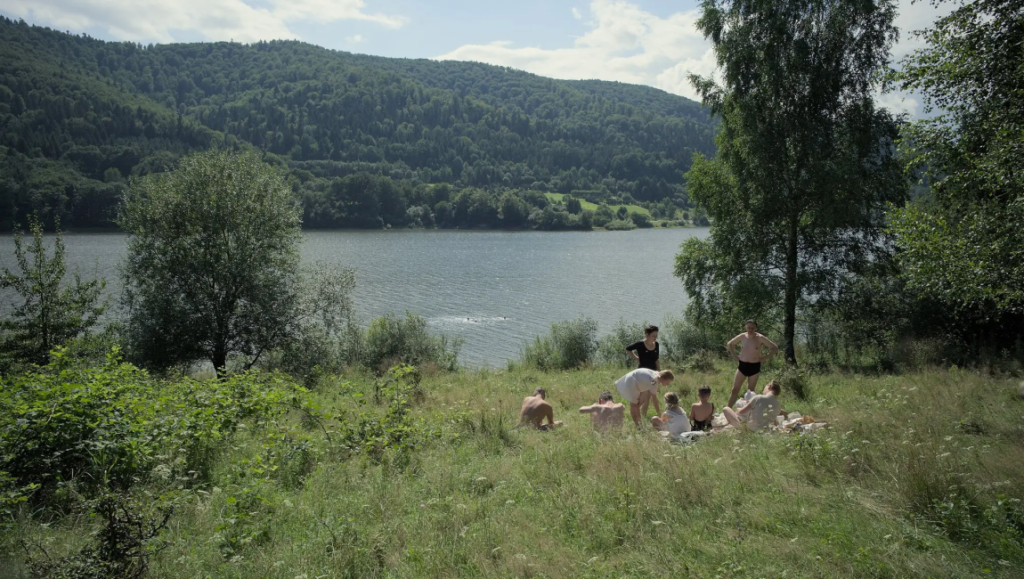The issue at the heart of Jonathan Glazer’s The Zone of Interest is one of the oldest in the cinema: how does one represent the unrepresentable? Loosely adapted from Martin Amis’ novel of the same name, and set in 1942, the film is centered around the Höss household: a German family who live in a large, two-story house with tasteful, minimal decor, complete with a swimming pool, a greenhouse, and a flourishing garden. The house also happens to be located directly across from the Auschwitz death camp. The film’s conceptual hook, if it can be called that, is that the horrors of the Holocaust will be deliberately kept off-screen and only indirectly represented — no violence will be visually depicted within the frame. Instead, we will mainly observe as Rudolf Höss (Christian Friedel), a German SS officer and the camp’s commandant, goes about his job, while his wife, Hedwig (Sandra Hüller), keeps house and tends to the children. A visit from Hedwig’s mother, who marvels at how well her daughter has done for herself, drives the film’s conceit home: the slaughter of the Jews by the Nazi regime will be refracted through the Höss family’s blinkered, bourgeois privilege.
Though somewhat specious in broad outline, this conceit is not, in itself, cause for suspicion. Of more concern, ultimately, is the fact that Glazer has a rather limited, thuddingly literal understanding of representation. In each and every one of his meticulously composed frames, he does little more than portentously accentuate the out-of-field, drawing attention to what lies just beyond the visible image. Thus, we will only ever see the smoke of the trains that periodically arrive at Auschwitz. A shot of Friedel in the camp will be angled upwards in such a way that we see only the blue sky above him, even as we hear screams and shooting all around. A child will play in his room, stop momentarily to look out a window when he hears a commotion outside, and then resume his game as before. With Under the Skin (2013), Glazer delivered a panoply of arresting, Kubrickian images that synced well with the film’s literally alien subject. In Zone of Interest, he does something similar, employing a range of visual effects that keep the Höss family at a chilly remove, as well as irruptions of imagery meant to signal still-deeper, more unrepresentable layers of disquiet. But as there’s no natural place for free-floating abstraction à la Under the Skin, Glazer’s taste for portent here becomes wedded to a fairly simple, and indeed simplistic, treatment of off-screen space.
The Zone of Interest modulates its approach in precisely one sequence, where Glazer ties an incipient narrative development — Rudolf informing Hedwig that he has been transferred and that they may have to move — to his usual formal assertiveness in a manner reminiscent of Alan Clarke. It’s the one scene where Glazer does something other than keep the Höss family at an alienating remove. Winner of this year’s Grand Prix, The Zone of Interest has already been — and will continue to be — praised for its unfailing control and precision; and such statements do stand to reason. But if Glazer does not step a foot wrong, it’s because he does not risk much to begin with. The film is, to be sure, formally and conceptually coherent, even airtight. But coherence is not the same thing as audacity, and with the arguable exception of the film’s final moments, which briefly venture into territory that recalls Sergei Loznitsa’s Austerlitz (2016), Glazer has made a film that, very much despite its subject, plays it safe.
DIRECTOR: Jonathan Glazer; CAST: Christian Friedel, Sandra Hüller, Medusa Knopf; DISTRIBUTOR: A24; IN THEATERS: December 15; RUNTIME: 1 hr. 46 min.
Originally published as part of InRO Weekly — Volume 1, Issue 21.5.


Comments are closed.